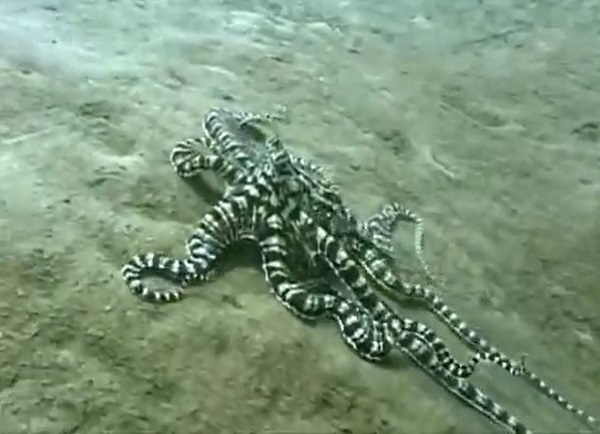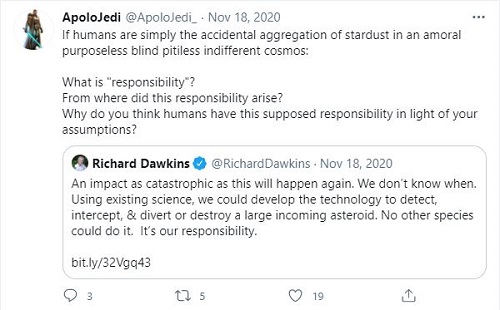So here we are at another February 12th, Question Evolution day. Since it's already late in the day I'll try to keep this short. But to put things in context, I need to preface my questions for Darwinian evolution believers with a question. Consider the following:
Concerning Purpose
A student is given an assignment to write a 1,000 word essay. The student completes the assignment and turns in the essay. The essay sounds familiar to the teacher so the teacher checks a plagiarism checker and as suspected, the student has plagiarized another work. The teacher confronts the student and says, "Your paper, is almost precisely word for the word the same as this published work. You're guilty of plagiarism and will get no credit for your paper."
The student says, "Well that must be an accident. I must have accidentally written nearly the exact same words as this famous author. But I didn't plagiarize, so you can't penalize me."
The teacher replies. "No, that's impossible. It is not possible for you to have written word for word the exact same paper as this noted author, changing only things like your name and the location. You have intentionally copied from this published author. The assignment was to allow me to see your work, your thoughts. Not how well you can copy someone else's work. Since it is not reasonable to conclude you 'accidentally' came up with the same paper, nearly word for word, as this author, I must conclude you intentionally and purposefully copied. You'll get no credit."
I will assume that you agree with the teacher that the student could not have "accidentally" come up with the same paper for the same reason you could not "accidentally" guess a password that is 1,000 words long, or the words in my next article. If you came up with the same password, or my next article, that would indicate two things: 1. You had access to the original; and 2: You intentionally copied it. Such a string of words would not come together accidentally.
The Mimic Octopus
Which brings us to our questions for evolutionists today. They're actually in two separate categories, but first let me present the topic: The mimic octopus. View this video on the Indonesian mimic octopus and I'll present the questions afterwards:
So you've seen the amazing capabilities of the Indonesian mimic octopus. Which include:
Swimming like a flounder - "flattening its body and matching the color
of the sand." And undulating low across the bottom - just like a real
flounder
* Swimming like a lionfish. It alters both shape and behavior to
impersonate a fish that swims well above the bottom - the lionfish.
lionfish fins are tipped with venom. So predators learn to avoid them.
By its deceit the octopus shares that protection.
* Imitating a poisonous sea snake - amongst the most poisonous animals
on earth
* The ability to change color - an ability shared by many octopi and
squids
Before I pose my question, let me remind you what the ApoloJedi often reminds evolutionists who don't understand the requirements of Darwinian evolution. That according to the theory, all creatures are merely an "accidental aggregation of stardust in an amoral and purposeless blind pitiless and indifferent cosmos."
That means, as evolutionists like Richard Dawkins and Will Provine tell us, there is no purpose, no design, no intent involved in the creation of the of the universe, or living creatures.
The first category of question concerns purpose. As we saw with our student plagiarist above, things that are copied are done so purposefully. You don't "accidentally" copy something. You do so purposefully. Whether the original is a complex paper; or a complex set of behaviors, movements and coloring of multiple creatures - a copy does not come about accidentally. It only comes about purposefully. Yet Evolutionists like Dawkins and Provine tell us there is no purpose, no intention in the universe in its creation. Given evolutionary constraints, how did the mimic octopus gain those capabilities since neither it, nor Darwinism could purpose to give it those capabilities? (The creationist answer is easier: God gave it those capabilities when he created it.)
The second category of questions concerns process. How could a regular octopus gain the benefits of mimicking other sea creatures in evolutionary time before being devoured by a predator? By evolutionary time, I mean the millions of years it would have supposedly taken to evolve the above abilities and properties. Like going from a creature that cannot change color to one that can. How does it even know it should do so since it can't purpose to do so?
If you want to change your skin color to hide yourself in the jungle - can you just wish it? Of course you can't. How did the ability to change color evolve in octopi at all, particularly before their lack of ability to do so made them easy prey? And how would they even know they should do so, since they're just an "accidental aggregation of stardust" with no purpose? Does the dust in your backyard purpose to change color at will ?
Concerning imitating these behaviors, how did the first mimic octopus learn them? How did it know swimming like a lionfish would scare off other creatures? How did it know that imitating a poisonous sea snake would be beneficial? Remember - it has to learn the behavior and perfect it before the predator devours it.
So, these are the questions for Question Evolution Day 2021. Okay evolutionists, I'm ready to hear your just-so stories of where the purpose, the intention to copy came from. And then the just-so stories of how the actual capabilities -these amazing capabilities to change color, shape and form to imitate other creatures developed. How these abilities evolved over millions of years. I'm sure your answer will be creative - and I'm looking forward to having a good laugh.
Duane Caldwell | February 13, 2021
Follow @rational_faith_
(Note the new Twitter account)

